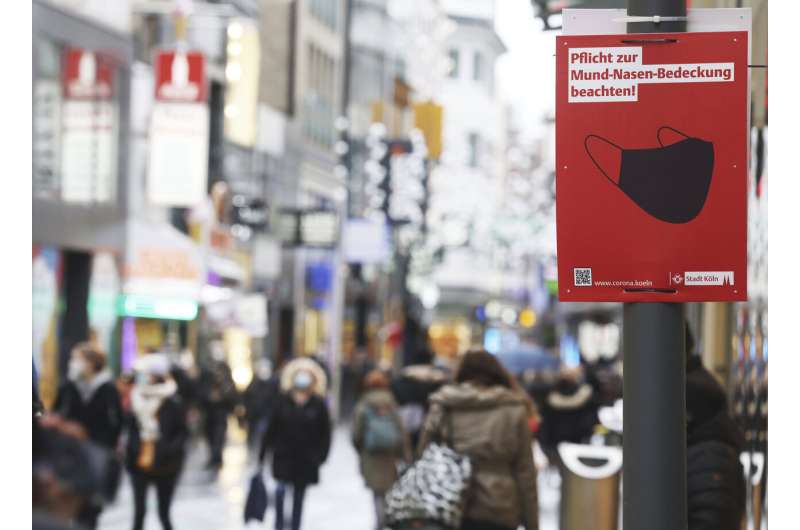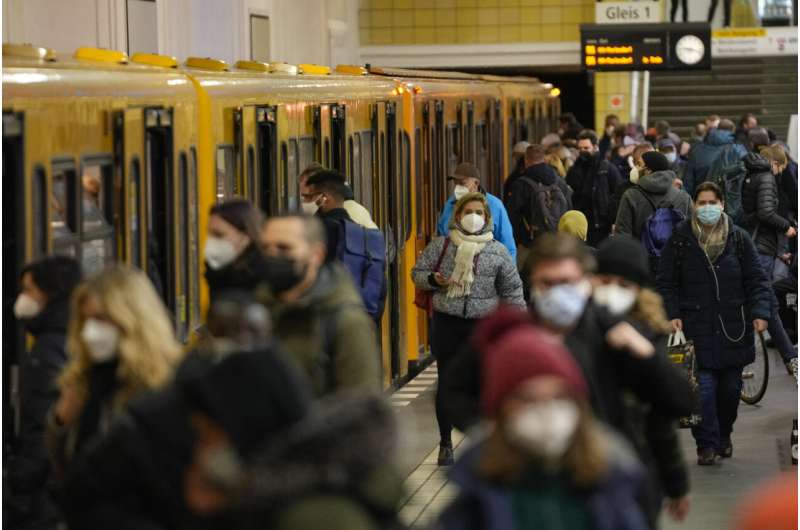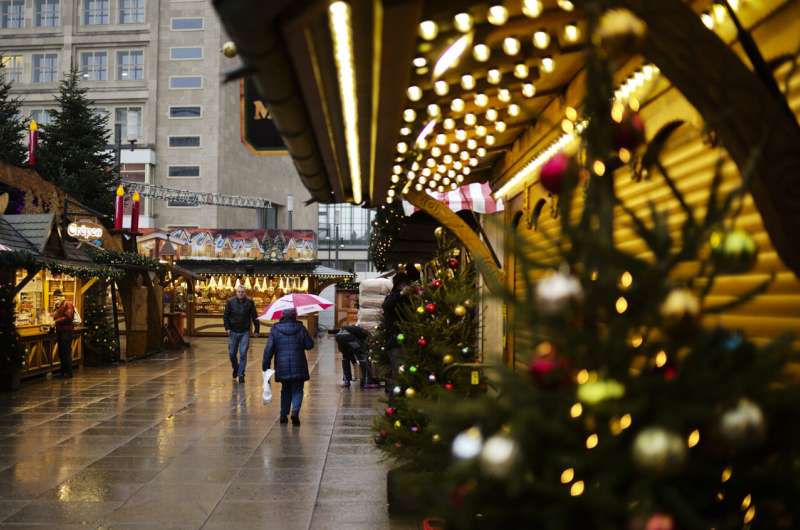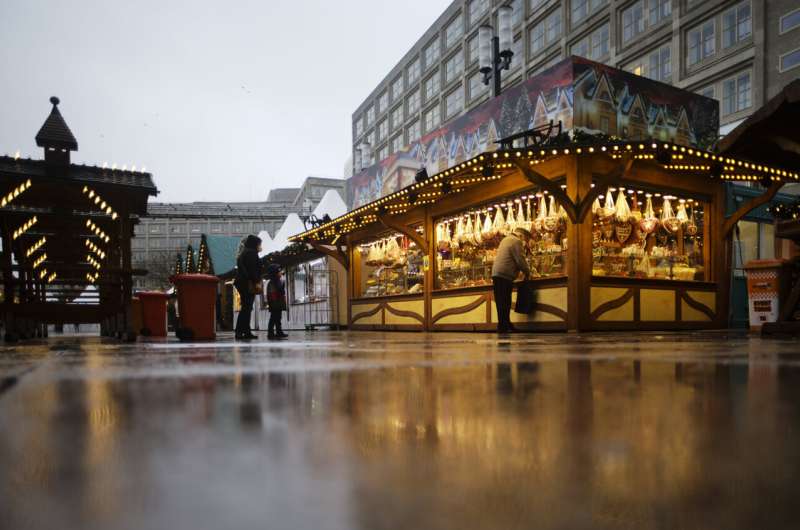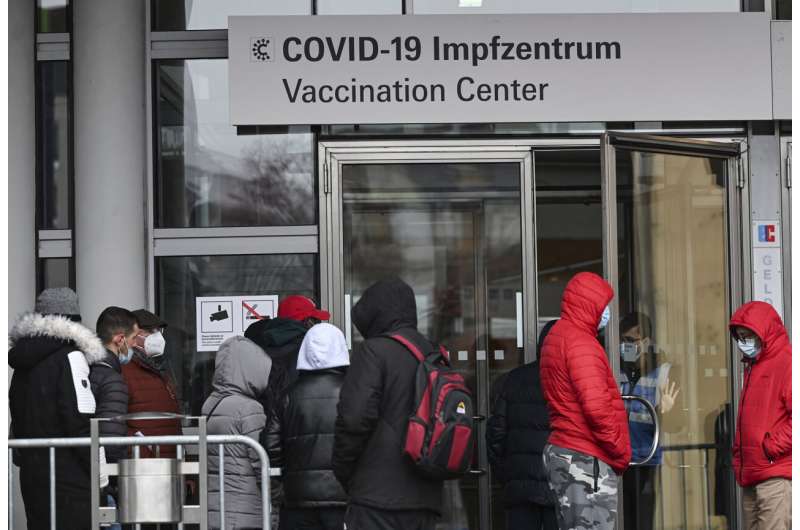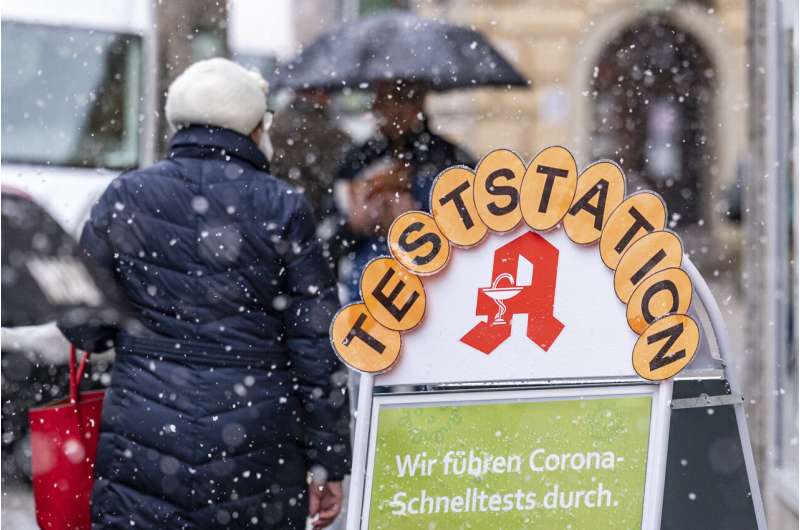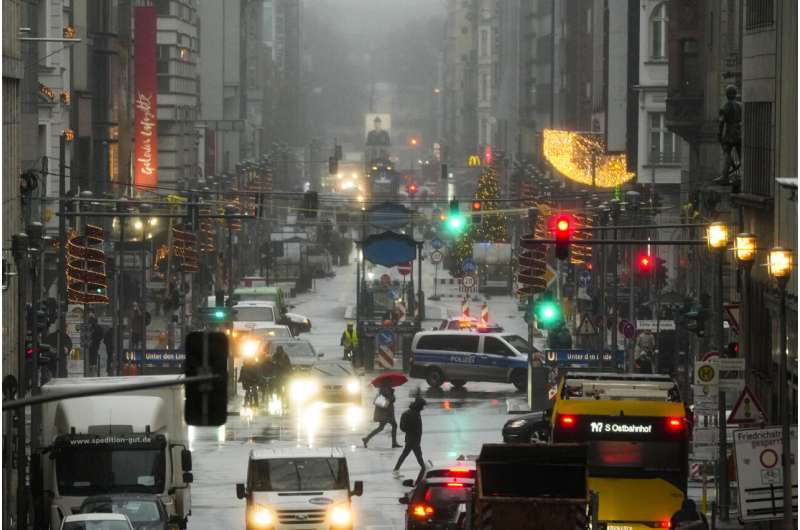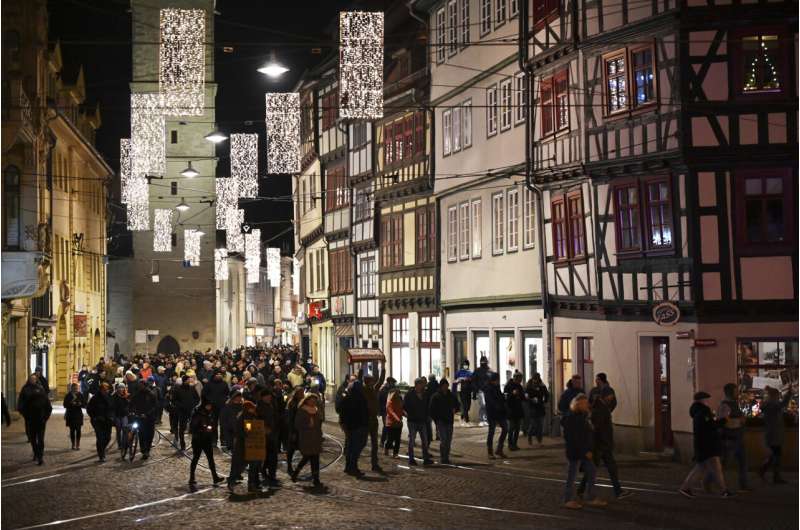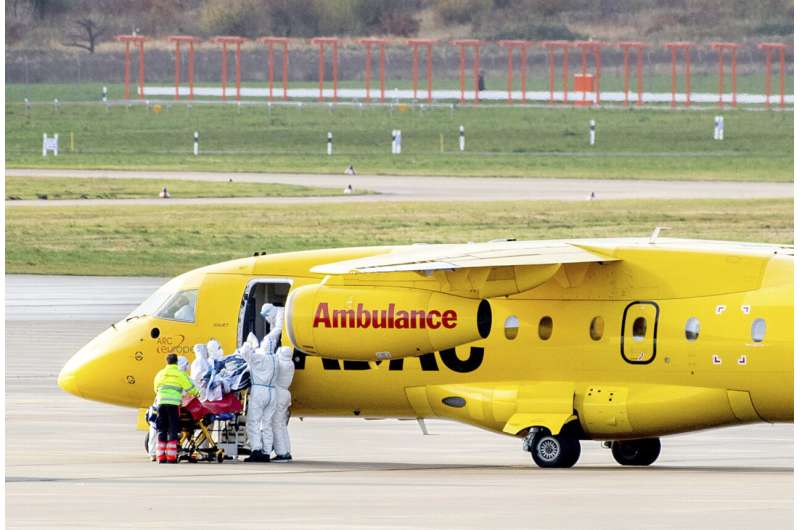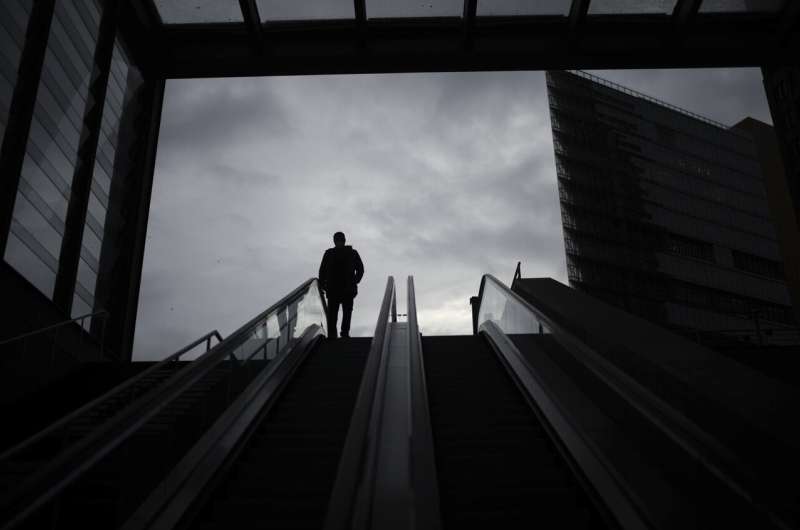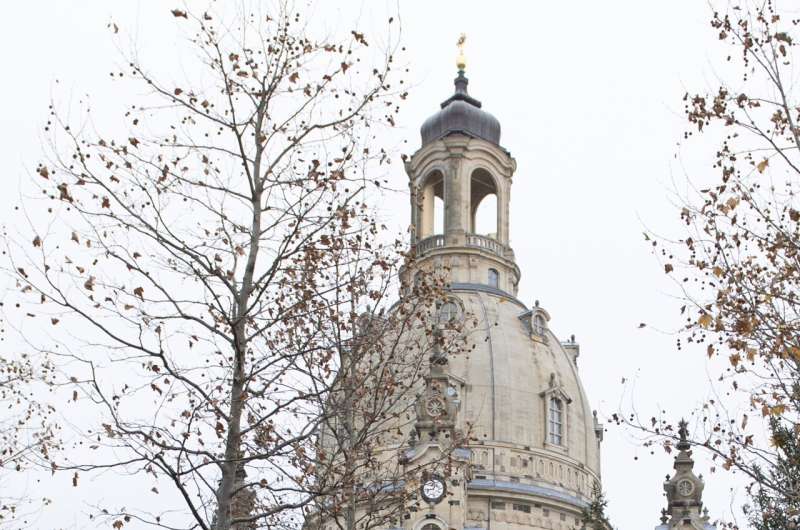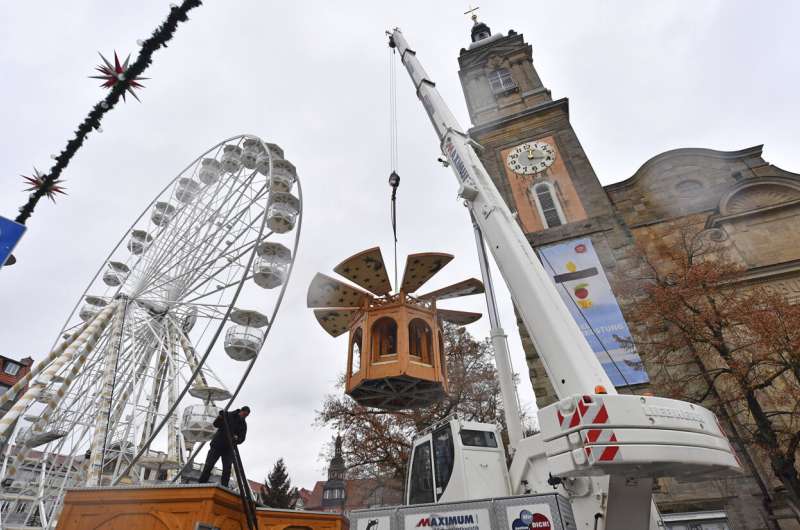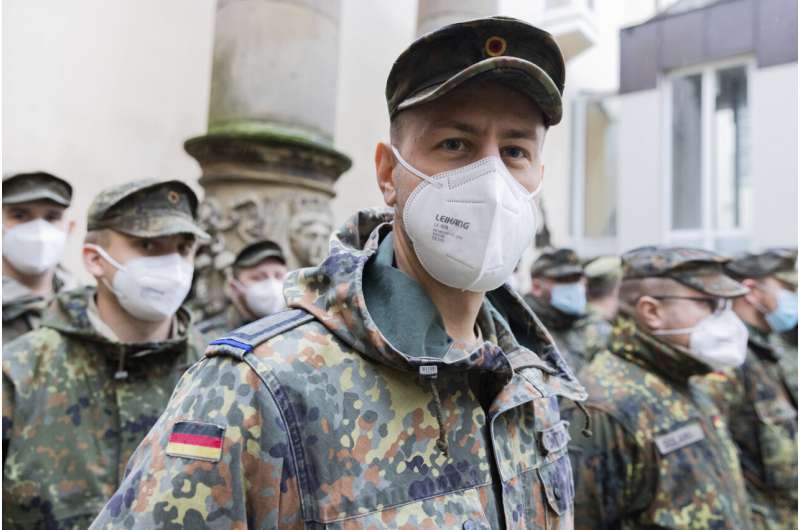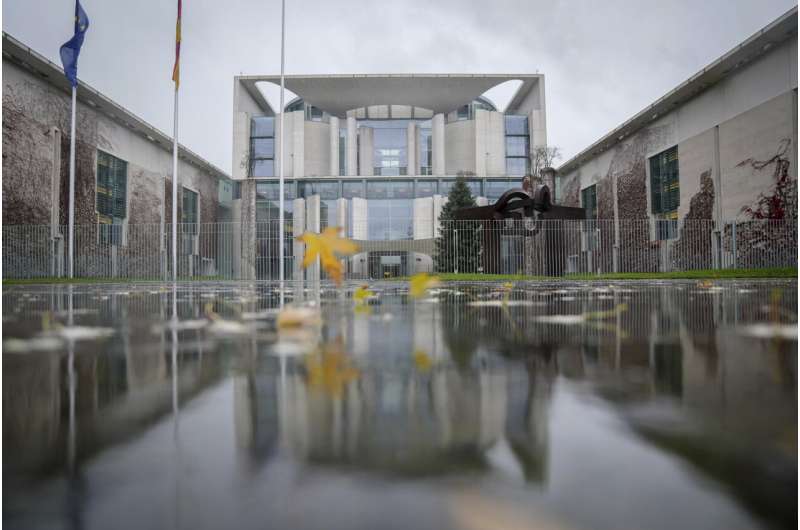A sign in the pedestrian zone indicates that masks are mandatory in Cologne, Germany Tuesday, Nov. 30, 2021. In North Rhine-Westphalia, protective measures are to be tightened this week in view of the intensified Corona situation. Credit: Oliver Berg/dpa via AP
Germany's national and state leaders will decide Thursday on new measures to tackle a sharp rise in coronavirus infections, officials said after the country's outgoing and incoming chancellors conferred with governors.
The measures are likely to include restrictions on shopping for unvaccinated people and limiting crowds at soccer matches, along with possible moves toward a vaccine mandate for all.
Outgoing Chancellor Angela Merkel and her designated successor, Olaf Scholz, held talks with Germany's 16 state governors on Tuesday, hours after the country's top court strengthened politicians' hand by rejecting complaints against curfews and other restrictions imposed earlier this year.
Many states have tightened rules of their own accord, but experts and politicians have called for more coordinated national action as infection rates hit new highs. Germany's federal structure and the transition from Merkel's national government to a new one under Scholz since the country's September election have slowed decision-making.
Tuesday's talks brought agreement that "additional measures" are needed to reduce infections and pressure on hospitals, Merkel's spokesman, Steffen Seibert, said in a statement.
Proposals include contact restrictions for unvaccinated people in particular, requiring people to present proof of vaccination or recovery at nonessential shops, and restrictions on major events, he said.
People wear face mask to protect against the coronavirus at the public transport station Friedrichstrasse in Berlin, Germany, Tuesday, Nov. 30, 2021. According to local authorities wearing face masks mandatory in public transport and passengers need to be vaccinated, recovered or tested negative of the coronavirus. Credit: AP Photo/Markus Schreiber
In addition to limited vaccine mandates for some facilities that are already in the works, he said there is also the proposal that "a prompt decision on a general vaccine mandate should be prepared." Neighboring Austria has already decided to make vaccinations compulsory from February.
Seibert said that a new permanent expert group to advise officials on how to tackle the pandemic, whose creation Scholz announced last week, will be headed by Gen. Carsten Breuer, the military's head of domestic operations.
Officials stressed the need to step up Germany's vaccination campaign and allow more people to perform vaccinations.
"It has taken a bit long, there has been back and forth and some conflict on the question of who should do what when, but as of today that seems solvable," Markus Soeder, the governor of Bavaria, said after Tuesday's videoconference. "Final decisions" need to be hammered out at the meeting of national and state leaders on Thursday, he said.
People walk across a Christmas Market on a rainy morning in central Berlin, Germany, Tuesday, Nov. 30, 2021. According to local authorities, except of shops for essential needs, only people which are vaccinated or recovered from coronavirus are allowed to enter shops. Credit: AP Photo/Markus Schreiber
The governor of the worst-affected state of Saxony, Michael Kretschmer, said he expects an agreement then to play Bundesliga soccer matches without spectators. Soeder signaled there's still some disagreement on that, but said that "if Christmas markets are closed, it is not consistent to have full stadiums." He said he would propose excluding spectators until at least the end of the year.
New infections have soared in recent weeks in the European Union's most populous country—particularly in the east and south, with hospitals there already transferring intensive care patients to other parts of Germany. They have hit levels much higher than those the country saw earlier this year, though many more Germans are vaccinated now than they were then.
On Tuesday, the country's seven-day infection rate dipped for the first time in over three weeks but, at 452.2 new cases per 100,000 residents, was only just short of Monday's record of 452.4. The country's disease control center, the Robert Koch Institute, said 45,753 cases were reported over the past 24 hours. Another 388 deaths were recorded, bringing Germany's total so far to 101,344.
-
Customers wait in front of a Christmas Market on a rainy morning in central Berlin, Germany, Tuesday, Nov. 30, 2021. According to local authorities, except of shops for essential needs, only people which are vaccinated or recovered from coronavirus are allowed to enter shops. Credit: AP Photo/Markus Schreiber
-
People waiting to be vaccinated queue up at the entrance to the Covid-19 vaccination centre at the Frankfurt exhibition grounds in Frankfurt, Germany, Tuesday, Nov. 30, 2021. Nevertheless, the city of Frankfurt sees its vaccination campaign thwarted by a lack of vaccine. Although the vaccination campaigns of the public health department were very well received by the citizens and the demand had recently increased strongly, the city now had to limit its vaccination offers - because the vaccine quantities ordered by the public health department had been unilaterally reduced by the federal government, the public health department announced on Monday. Credit: Arne Dedert/dpa via AP
-
A sign reads "Test station"" in front of a pharmacy in Vilshofen, Germany, Tuesday, Nov. 30, 2021. The number of new corona infections per 100,000 inhabitants in the district of Passau is currently over 1000. Credit: Armin Weigel/dpa via AP
-
People cross the shopping street Friedrichstrasse in central Berlin, Germany, Tuesday, Nov. 30, 2021. According to local authorities, except of shops for essential needs, only people which are vaccinated or recovered from coronavirus are allowed to enter shops. Credit: AP Photo/Markus Schreiber
-
People with candles walk along the old town of Erfurt, Germany, Monday, Nov. 29, 20212. In the state capital, hundreds of people have gathered for an unannounced Corona protest. The incidence of corona in Thuringia continued to rise at the start of the week. Credit: Martin Schutt/dpa via AP
-
One of two Covid 19 patients is unloaded from a Dornier 328Jet ADAC aircraft by rescue workers at Hanover airport for transfer to hospital by intensive care transport in Langenhagen, Germany, Tuesday, Nov. 30, 2021. Seriously ill patients from intensive care units in Bavaria, Thuringia and Saxony are being transported to areas in the north and west of Germany that are currently less severely affected as part of the "cloverleaf" mechanism coordinated between the federal and state governments throughout Germany. Credit: Hauke-Christian Dittrich/dpa via AP
-
A person enters the public transport station Potsdamer Platz in Berlin, Germany, Tuesday, Nov. 30, 2021. According to local authorities wearing face masks is mandatory in public transport and passengers need to be vaccinated, recovered or tested negative of the coronavirus. Credit: AP Photo/Markus Schreiber
-
Empty tables and chairs stand in front of a closed cafe on the Neumarkt in front of the Frauenkirche in Dresden, Germany, Tuesday, Nov. 30, 2021. Credit: Sebastian Kahnert/dpa via AP
-
The Christmas market on the market square next to St George's Church is being dismantled in Eisenach, eastern Germany, Tuesday, Nov. 30, 2021. It had opened on November 22, but had to close on November 24 due to a new Corona regulation. Thuringia is considered one of the states in Germany most affected by the fourth wave of the Corona pandemic. Credit: Martin Schutt/dpa via AP
-
Soldiers of the Bundeswehr stand in the inner courtyard of the town hall in Duesseldorf, Germany, Tuesday, Nov. 30, 2021. In view of the sharp rise in the number of Corona infections, local authorities in North Rhine-Westphalia are again increasingly asking the Bundeswehr for help. Credit: Rolf Vennenbernd/dpa via AP
-
Leaves blowing in the wind across the forecourt in front of the Federal Chancellery in Berlin, Germany, during the federal states meeting on the Corona Pandemic, Tuesday, Nov. 30, 2021. Credit: Kay Nietfeld/dpa via AP
At least 68.5% of the population of 83 million is now fully vaccinated, but that's below the 75% minimum threshold the government hoped for.
Earlier Tuesday, Germany's Federal Constitutional Court found that the most controversial measures contained in federal "emergency brake" legislation that was in place from April until the end of June were in line with the constitution. Those included a 10 p.m.-5 a.m. curfew and school closures in areas with high coronavirus infection rates.
That added to pressure for officials to act—as has the appearance in Germany and many other countries of the new omicron variant of the coronavirus.
© 2021 The Associated Press. All rights reserved. This material may not be published, broadcast, rewritten or redistributed without permission.
